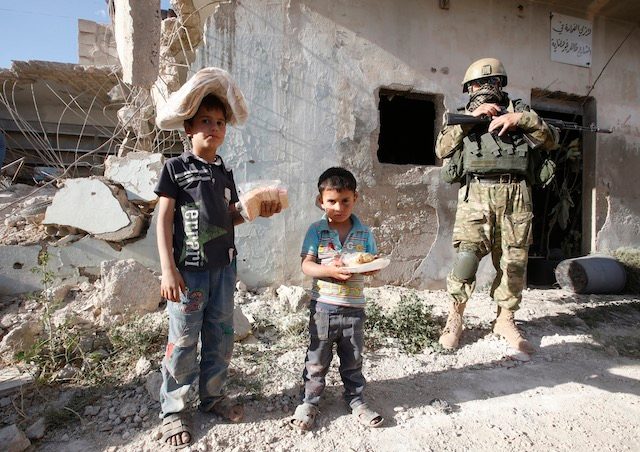SUMMARY
This is AI generated summarization, which may have errors. For context, always refer to the full article.

ALEPPO, Syria – Under pressure from Russia and the United States, the Syrian army agreed on Wednesday, May 4, to respect a two-day truce in the war-ravaged city of Aleppo.
The Syrian climb-down came after Washington said the US and Russia had agreed to push the warring parties to extend their shaky ceasefire.
“A truce will be in place in Aleppo for 48 hours from 1:00 am on Thursday (May 5) (2200 GMT Wednesday),” Syrian army command said, according to state media.
The Russian defense ministry said its ceasefire monitors had agreed with their US counterparts to oversee this truce until midnight on May 6.
But for his part, US Secretary of State John Kerry said a new Aleppo truce had already begun at at midnight Syrian time (2101 GMT Tuesday) and that violence had already fallen off.
On the ground, Agence France-Presse correspondents said fierce fighting continued in both Aleppo and an area west of Damascus that was already under the ceasefire regime.
“We’ve seen an overall decrease in violence in those areas even though there are some reports of continued fighting in some locations,” Kerry said.
Kerry added that US officials in Geneva were coordinating with their Russian colleagues on “enhanced monitoring efforts for this renewed cessation.”
And he stressed that for Washington, the “cessation of hostilities” must spread nationwide and underpin a return by both sides to peace talks in Geneva.
War crimes
Russia and the US were joint sponsors of the previous February 27 ceasefire agreement that had begun to fall apart, especially around Aleppo.
The city is divided between Bashar al-Assad’s government forces, Western-backed opposition forces and Al-Nusra Front rebels not party to the ceasefire.
Last week, Russia agreed to a ceasefire in Latakia and a suburb of Damascus but said Assad should be allowed to fight Al-Nusra “terrorists” in Aleppo.
Intense fighting continued in the city, and hospitals in both rebel and government-held areas were hit, which two top UN officials warned Wednesday amounted to war crimes.
On Sunday, May 1, Kerry flew to Geneva for talks with UN peace envoy Staffan de Mistura, who in turn went to Moscow for talks with Russian Foreign Minister Sergei Lavrov.
By Wednesday, Kerry felt confident enough in Russia’s “buy-in” to the process that the State Department was able to announce what it hopes will be a new truce.
Nevertheless, in Aleppo new explosions could be heard.
Rami Abdel Rahman, head of the London-based Syrian Observatory for Human Rights, said the fighting was “the most violent in Aleppo in over a year”.
Rocket barrage
According to the Syrian state news agency SANA, in recent days rebels have fired a barrage of rockets into regime-held neighborhoods in western Aleppo.
Three more civilians were killed in the attacks early on Wednesday, it said.
Regime warplanes struck the advancing rebels, giving opposition-held areas of eastern Aleppo a respite from the bombing, an Agence France-Presse correspondent in the city said.
Suspected regime strikes also pummeled the rebel stronghold of Eastern Ghouta near Damascus, after a temporary freeze in the area expired overnight.
Kerry confirmed these strikes, but said the joint US-Russian ceasefire monitoring centre which is being set up in Geneva would redouble its efforts.
Russia had said on Tuesday, May 3, it hoped a new ceasefire could be agreed “within hours” but on Wednesday said truce efforts had been stymied by jihadists.
Russian military spokesman Igor Konashenkov said a plan had been agreed for Aleppo but fell apart after rocket attacks by Al-Nusra, an Al-Qaeda affiliate.
The UN’s top political affairs officer Jeffrey Feltman and Stephen O’Brian, its aid chief, told the Security Council that those responsible for the hospital attacks and starvation sieges in rebel-held eastern Aleppo should face trial for war crimes.
The UN said the Syrian government had refused a request for aid access to Aleppo.
The diplomatic push seeks to restore peace talks aimed at ending a five-year war that has left more than 270,000 dead and forced millions from their homes.
France announced on Wednesday that it would also host talks with the Saudi, Qatari, Turkish and Emirati foreign ministers on Monday next week.
These countries back the Syrian opposition, and French government spokesman Stephane Le Foll said they would focus on efforts to move deadlocked peace talks forward.
Syria’s civil war erupted in 2011 after Assad brutally suppressed anti-government protests, and quickly escalated into a multi-front conflict.
Jihadist forces, including the Islamic State group, seized large tracts of the country, leaving civilians and opposition rebels besieged in western cities. – Karam al-Masri with Dave Clark in Washington DC, USA, AFP / Rappler.com
Add a comment
How does this make you feel?
There are no comments yet. Add your comment to start the conversation.